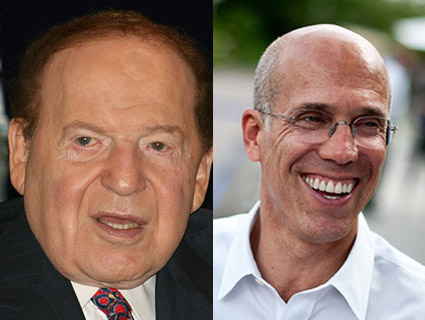One evening this past October, I went prospecting for natural-gas man Trevor Rees-Jones at the posh Hilton Anatole in Dallas. He was there to receive the Robert S. Folsom Leadership Award, a philanthropic prize that in recent years has gone to the likes of Laura Bush and former Cowboys quarterback Troy Aikman. Unlike these prominent Texans, Rees-Jones is not widely known outside his hometown. If the name sounds familiar, it’s probably because he shares it with the British bodyguard who survived Princess Diana’s fatal car crash. The Trevor Rees-Jones that I came to see is the billionaire founder of Dallas-based Chief Oil & Gas and perhaps the fastest-rising star in Republican big-money circles.
 Photo: Scott Womack
Photo: Scott Womack
The dinner’s PR people had promised me tickets, then changed their minds and, with apologies, yanked them. So I called up my sister, a Dallas debutante of recent vintage, to help me crash the thing. As we strolled through the Hilton’s cave-like lobby in cocktail attire, we saw a troop of young Boy Scouts milling about. One of them inquired about our destination and then helpfully directed us to the event’s open bar. An Eagle Scout himself, Rees-Jones has donated millions of dollars to scouting causes.
A few days earlier, Rees-Jones’ high school acquaintance, the renowned GOP bundler Jim Francis, had thrown him a party with guests that included George W. Bush. Now Francis’ broad-shouldered son, Jim Jr., was holding forth in the lobby about a Lenin statue that once stood outside his burger joint. (Inscription: “America Won.”) It was eventually sold on eBay to some guy in Arkansas. “Perfect!” someone exclaimed. “That’s where it should be!”
We all laughed at the Clintons’ expense. I then asked Francis if he thought Rees-Jones would go all in on the 2012 presidential race. “Oh, yeah!” he gushed before realizing he had no idea who I was. “Uh, I think a lot of the big political backers are waiting to see what happens,” he added vaguely. “I think it will be a real interesting year.”
I’d been trying to speak with Rees-Jones for more than a month. I’d even shown up at Chief’s headquarters, but nobody would see me. Recognizing the CEO by his ruddy complexion and Regis Philbin hairstyle, I approached the bar where he stood flanked by a towering bodyguard with a Band-Aid on his neck. With slight trepidation, I introduced myself, asking if we might arrange a time to talk. His face reddened. “I’ve been advised of your agenda, so I don’t think that’s gonna be possible,” Rees-Jones snapped in a West Texas drawl that belied his Ivy League education. His sideman moved closer and my sister and I turned heel, working our way past a tightening cordon of security.
A pity, for had we stuck around, we could have caught Karl Rove taking the stage beside a large model pump jack and oil derrick to do some prospecting of his own. Rees-Jones “is what servant leadership is all about,” Rove said, throwing a bone to the Christians in attendance, though a society blogger covering the event emphasized his saltier extolments: George W. hadn’t made it to the dinner, Rove explained, because he was angry that Rees-Jones always beats him when they go mountain biking together. “He rides the president’s sorry ass into the ground every time.”
Two days later, I’m in Towanda, Pennsylvania, a quaint little town where the main street is Main Street and stores display their names on hand-painted signs. In one of these shops works Crystal Stroud, a 29-year-old hairdresser. After work each day she used to drive through hills of elm and hemlock to her modest ranch house overlooking a red dairy barn, a cornfield, and a stream where her four-year-old boy liked to play. When she and her husband moved in four years ago, she decorated a kitchen wall with a quote from Corinthians: “Faith, Hope, Love: The greatest of these is Love.” Now those words are the only indication that she used to live there.
This past March, Stroud’s hair began falling out in clumps; her husband, a plumber, had to tear the shower drain apart twice to unclog it. She became jumpy and anxious and began having trouble breathing—even grocery shopping required rest breaks. A doctor prescribed her some anti-anxiety meds, and within a couple of days Stroud began to stutter. Her hands shook so badly she could no longer cut hair.
A few weeks earlier, Rees-Jones’ firm had begun drilling a natural-gas well on a steep hill about 400 yards behind her home. Stroud, who typically drank four to six glasses of tap water a day, had promptly hired a testing firm to get the quality of her well water on record before Chief commenced fracking—a process that uses pressurized sand, water, and chemicals to smash up shale and release trapped gas.
She didn’t give the test any further thought until mid-April, when the lab called to say that her water was laced with elevated levels of barium. (It also contained dangerous amounts of flammable methane.) She hung up the phone and broke down crying.
Stroud spent the next week calling gas companies and state officials in search of answers. Finally, the state’s Department of Environmental Protection (DEP) suggested she contact Richard Adams, Chief’s senior environmental adviser, who promised to come to her place the next day to discuss the problem and sample her well water. Instead, Adams sent an industry consultant to take a sample. “Two weeks went by and Chief was ignoring me and not calling me back,” she recalls. “I realized pretty quick that this company was not going to be helpful and do the right thing.” As it happens, Adams is a former DEP official who helped create the state’s fracking regulations. (Chief has denied ignoring Stroud.)
The DEP said it would work with Chief to figure out what went wrong. So the couple stayed put, hiring a firm to truck in potable water. A DEP employee took more samples, and then, in July, the agency called to say that her well was likely contaminated long before Chief started drilling. Stroud, a lifelong Republican who had always been skeptical of government regulation, was aghast. “I probably called him every four-letter word in the book,” she recalls. “I asked if they were insane, and who they were being paid off by.”
Trevor Rees-Jones spent next to nothing on politics prior to 2008, but he has since emerged as one of the nation’s leading GOP spenders. In Pennsylvania alone, he and his wife and employees donated $72,500 to pro-industry Republicans during the 2010 election cycle; all told, they gave at least $1.3 million to state and federal candidates and $400,000 to state-level political groups, including nearly $150,000 in political donations this fall.
All of this giving coincides with a growing public backlash against fracking in the shale regions of Appalachia and Texas. Rees-Jones’ contributions have flowed to Republicans like Texas Gov. Rick Perry, who accuses the Obama administration of “trying to scare people” away from exploiting gas reserves; Sen. Rob Portman of Ohio, who wants to eliminate “unnecessary rules and regulations” limiting gas development; and Rep. David McKinley of West Virginia, an outspoken foe of the Environmental Protection Agency.
He also was among the top early contributors to dark-money outfits that sprang from the Supreme Court’s Citizens United decision—groups that can raise and spend unlimited sums on political advertising. During the 2010 cycle, he gave $2 million to the Karl Rove-advised American Crossroads super-PAC, part of a galaxy of organizations with minimal levels of disclosure. Only four others gave more to outside political groups. (Read our roundup of other top Texas donors.)
Rees-Jones, whom Forbes pegs as the 88th-richest American, lives in an $11 million English-manor-style mansion with eight fireplaces, Tuscan pilasters, and security gates adorned with a coat of arms sporting roosters, a knight, swords, and fleurs-de-lis. One day last year, Perry joined him there at a daytime fundraiser for the Republican Governors Association. The same evening, Rees-Jones hosted an intimate dinner at the Dallas Petroleum Club with Pennsylvania Gov. Tom Corbett. “I’m riding at a pretty high altitude right now,” he told the Dallas business lifestyle magazine D CEO.
 Crystal Stroud claims Rees-Jones’ firm contaminated her drinking water. John LoomisRees-Jones was raised in University Park, an affluent Dallas suburb where BMWs outnumber pickup trucks. His father was an oil and gas attorney and a member of the prestigious Idlewild Club, his wife the daughter of a regional manager for a pharmaceutical firm. Still, it was his own grit, luck, and cojones that lifted Rees-Jones into the ranks of Texas’ superwealthy. After a brief stint as a bankruptcy lawyer, he tried his hand as a wildcatter, or speculative driller. In the mid-’90s he raised close to $200,000 from four investors to tap a Dallas-area gas field, a play that paid off thanks to a technique called horizontal fracking.
Crystal Stroud claims Rees-Jones’ firm contaminated her drinking water. John LoomisRees-Jones was raised in University Park, an affluent Dallas suburb where BMWs outnumber pickup trucks. His father was an oil and gas attorney and a member of the prestigious Idlewild Club, his wife the daughter of a regional manager for a pharmaceutical firm. Still, it was his own grit, luck, and cojones that lifted Rees-Jones into the ranks of Texas’ superwealthy. After a brief stint as a bankruptcy lawyer, he tried his hand as a wildcatter, or speculative driller. In the mid-’90s he raised close to $200,000 from four investors to tap a Dallas-area gas field, a play that paid off thanks to a technique called horizontal fracking.
Anyone paying attention at the time knew this innovation was key to unlocking West Texas’ energy-rich Barnett Shale. “I am not taking anything away from Chief, but I don’t think he was a visionary,” says Sanford Dvorin, an engineer who has used the method. “To his credit, he was early to the table. Anybody could do it if they had the financing.”
By 2003, Chief, named after Rees-Jones’ Labrador retriever, was worth $138 million, and Rees-Jones convinced two of his original investors, D. Bobbitt Noel Jr. and Robert B. Allen, to cash out, arguing that the company had exhausted its best finds. In fact, given the latest fracking advances, Chief was sitting on a proverbial gold mine. Months earlier, one of its competitors, XTO Energy, had paid a small fortune for drilling rights in an area where Chief had substantial holdings. “If these numbers are right, you guys are knocking on the door of a billion,” a business associate had emailed Rees-Jones. “YEE HA!!!!!!!”
That was an understatement. Within two years, Chief had sold off its Barnett Shale assets for $2.6 billion. Rees-Jones turned around and partnered with Ross Perot Jr., son of the Dallas billionaire and former presidential candidate, to develop a new shale play near Fort Worth, grossing another $1.3 billion. He then jumped headlong into Pennsylvania’s booming Marcellus Shale, making Chief one of the state’s largest drillers. “He made a gazillion dollars,” Dvorin says. “And more power to him!”
The investors who’d sold out weren’t happy about being played for suckers. Both ultimately sued Rees-Jones, claiming he’d tricked them into selling their shares for pennies on the dollar. In March, a jury ordered Rees-Jones to fork over $116 million to compensate Noel, who had originally sold for $6.5 million. The Allen case is still pending. “When it comes to business he plays for blood, but once it’s five o’clock and he’s punched out, that’s all over,” says an employee of a major Dallas-based oil company who is familiar with Rees-Jones’ local reputation. “He views it as a game. These other people, it’s their job to do their homework, and if they get screwed, it’s their fault.”
The grandson of a Presbyterian minister, Rees-Jones wasted little time before pouring some of his hefty profits into philanthropy. In 2006, he and his wife, Janice, set aside $290 million to establish the Rees-Jones Foundation, which they presented as an extension of their Christian values; according to the foundation’s literature, its mission “is one of compassion designed to serve God by serving others, sharing his word and resources with those in need.” Since 2008, it has given $111 million to more than 200 groups, from Habitat for Humanity to the Dallas Christian Women’s Job Corps, doing much to soften Rees-Jones’ tough-guy business image.
To get a feel for his good works, I headed to a South Dallas neighborhood of tractor trailers and junkyards, hooking a right just past the concertina wire of a state juvenile facility. A man waved me into a complex of squat brick buildings where I met Jerry Silhan, a former record label guy who runs Youth Village, a rehabilitation program for young offenders. Funding from the Rees-Jones Foundation enabled Youth Village to reestablish an innovative training program that teaches troubled teens to train unwanted dogs. “We’ve got throwaway dogs and throwaway kids, to kind of oversimplify it,” Silhan explained. “And they are working on a lot of the same issues. It’s kind of magical.”
Inside a gym, two teenagers in white shirts and khakis were trying for the fifth time to get a puggle named Mosby to stay. Mosby held still a little longer than before and earned a handful of dog treats. “I know the program will help me in the future,” said an earnest young dog trainer in Chucks and thick glasses. “I want to get a job at a pet shop—as soon as I can stop being in trouble.” When it came time for me to leave, Silhan addressed me nervously. “I don’t know what your spin will be,” he said. “But I know what he and his family and foundation have meant for the guys out here. It’s huge.”
For Rees-Jones and his wife, the foundation helped provide entry into an orbit of fabulously wealthy and politically connected Texans, where alliances are forged among givers to the same cherished causes. (See chart, “How to Win Friends and Influence Elections.”) While riding in a golf cart with ExxonMobil CEO Rex Tillerson, who serves as president of the Boy Scouts of America, Rees-Jones agreed to donate $25 million to the Scouts’ Dallas chapter. He also gave $25 million to the Perot Museum of Nature and Science and another $25 million to Parkland Memorial Hospital, a favorite of old-line GOP money men like Harold Simmons—a major backer of Gov. Rick Perry, Rove’s American Crossroads, and the John Kerry-vanquishing Swift Boat Veterans for Truth. Janice Rees-Jones, who has a Dallas animal shelter named in her honor, was invited to join the board of the John Goodwin Tower Center for Political Studies at Southern Methodist University, where she serves alongside a who’s who of Texas politicos and business leaders. The Rees-Joneses aren’t politically active “by nature,” according to Jim Francis. They never speak publicly on political issues. Then again, with their connections, they needn’t.
The couple has even enlisted a few celebrities to cement their newfound cachet. They flew Jon Bon Jovi to their central Texas ranch for one recent bash, a mere warm-up to Trevor’s 60th-birthday celebration this past August, featuring the Eagles, the Blues Brothers, and Dynasty star Heather Locklear—Rees-Jones had a major crush on her, Francis told D CEO magazine. Dozens of private jets touched down on the ranch runway. Among the 900 guests were Perot Jr., T. Boone Pickens, and the billionaire GOP political player Robert Rowling.
A few hours after meeting with Crystal Stroud in Towanda, I walk over to the granite-walled Bradford County Courthouse for a chat with County Commissioner Doug McLinko. An affable man with a quick grin, he keeps a large framed photo of Ronald Reagan on his desk. Who needs big government, McLinko figures, with all these generous gas companies around? Chesapeake, Chief, East, Range, Fortuna: They’ve trucked off debris from a recent flood, repaired streets, and bankrolled dozens of local charities and community events.
More than many extraction firms, Chief projects a friendly image. “Responsibly drilling and producing clean natural gas,” its website proclaims. The company describes good corporate behavior as a core value and spreads cash goodwill all around—in 2009, for example, it gave $8,000 to the local Salvation Army unit McLinko chairs. But Chief’s charity doesn’t make him softer on the industry, McLinko insists. He has twice toured the Barnett Shale gas fields with industry reps and came away thinking that Texas’ “environmental standards are a hell of a lot more lax than ours are.” He’s sure he’d know about any problems in Bradford County. When I ask about Stroud’s contamination claim, he leans forward in his chair. “That proved to be false,” he says. “The water has been bad there forever.”
Indeed, the DEP concluded that Stroud’s water was in a “restricted flow zone” where methane and barium naturally accumulate from the surrounding soil, adding that its technicians found the same contaminants in several local wells. But Ron Bishop, a geology expert and lecturer at the State University of New York who has scrutinized the case, says the DEP appears to have simply replaced one assumption (that the drilling was a likely culprit) with another (that the well was contaminated naturally)—without presenting much evidence. “Which way does the aquifer run from the [gas] well? What is its depth? There are any number of things that would be easy to show that nobody has even alluded to,” he says. “I find it very troubling that the case was closed.”
In addition, four Duke University researchers who sampled water wells in the region as part of a peer-reviewed study determined that wells within 1,100 yards of a gas rig contained 17 times as much “thermogenic” methane—a type that originates deep underground—as wells located farther away (PDF). The DEP found that Stroud’s methane was also thermogenic but argued that it may have come from something besides drilling. Doubting the agency’s impartiality, Todd O’Malley, Stroud’s lawyer, submitted a freedom of information request and learned that Chief’s Richard Adams had written his former DEP colleagues complaining that Chief was being unfairly targeted and asserting that the pollutants in Stroud’s well were not “characteristic” of what one encounters when “simply drilling a gas well.” When a DEP manager disputed this, Adams responded that he would call to discuss the matter. He later showed up alongside state employees to resample Stroud’s water. While neither Chief nor DEP officials responded to my repeated requests for further details, O’Malley believes that “the DEP’s handling of our case has been improperly influenced by its connections to Chief.”
Rees-Jones’ clout in Pennsylvania goes beyond his environmental adviser’s revolving-door relationship. In 2010, he donated $50,000 to Tom Corbett’s gubernatorial campaign, helping him trounce Dan Onorato, his Democratic opponent. Corbett returned the favor by proposing an “impact fee” five times smaller than the gas extraction tax proposed by state Democrats. (Pennsylvania is the only major gas-producing state lacking such a tax.) The governor also appointed Terry Bossert, a government affairs executive for Chief, to his industry-dominated Marcellus Shale Advisory Commission. In July, the commission released recommendations for regulating the industry that were panned by environmental groups.
“You have to literally have a smoking gun and a bullet and a body lying dead in front of you for DEP to act,” Stroud told me later, standing by the water well on her now-abandoned property. There was so much methane in her well that the agency had Chief install a vent to keep it from exploding. Without clean water, her home, once valued at $160,000, is practically worthless. The family is also $22,000 in debt from covering her medical bills, potable water, and now rent on a new place. Since Chief won’t compensate Stroud for her losses, she intends to file a lawsuit.
She’s not alone in her predicament. According to activist Michael Lebron, at least 92 other Bradford County water wells near drilling sites have shown evidence of contaminated drinking water. In 2010, gas firms operating in the Marcellus Shale accrued more than 1,200 environmental violations, and Rees-Jones’ company led the pack with 176. In one case, Chief was cited for discharging wastewater directly into two streams. In another, it was ordered to pay $180,000 for nearly overfilling a fracking waste pit and failing to report a spill.
Some Pennsylvanians see an upside to the state’s three-year drilling boom. Gary Wilcox, who owns a 100-year-old jewelry store in Towanda, told me that selling roughnecks and their families gold-plated and diamond-studded gas derrick charms has “increased business quite a bit.” Yet many locals I spoke with were having second thoughts about all the drilling. A security guard at the gas well behind Stroud’s home explained why he wouldn’t let me past the gate by asking, “Do you really think it’s good?”
“Do you?” I asked.
“No,” he replied.
In the run-up to the 2010 midterm elections, a bare-knuckled attack ad hit the airwaves in Democrat Maurice Hinchey’s upstate New York congressional district. It juxtaposed a clip of the congressman saying “Shut up!” against claims that he’d voted to raise “job-killing taxes” and cut Medicare. The claims were deeply misleading, according to the nonpartisan watchdog site FactCheck.org. But that didn’t seem to trouble its creator, American Crossroads.
Hinchey wasn’t a logical target for the group. For one, he was a shoo-in; New York Times elections soothsayer Nate Silver put his chances of winning his deep-blue district at 93 percent. Yet Hinchey stood out from other congressional Dems in his commitment to better fracking oversight. In 2009, he coauthored the FRAC Act, which would do away with a loophole preventing the EPA from regulating toxic fracking fluids—a newer version is stalled in Congress. American Crossroads denied it targeted him for this reason, but Hinchey sees the gas industry’s fingerprints. After Citizens United, he told me, “If you’re interested in having reasonable regulations on frack drilling, as I am, a CEO for a shale gas company can decide to spend millions on ads attacking you and never be held to account.”
In Pennsylvania, Crossroads GPS—the arm of American Crossroads that doesn’t have to disclose its donors’ identities—spent at least $880,000 attacking Joe Sestak, a former Democratic congressman and fracking critic who narrowly lost his 2010 Senate bid to Republican Pat Toomey. Big donors hid behind the dark-money group because they knew “citizens didn’t trust them,” Sestak says. The fact that they can now do so, he adds, “has done a great deal of harm to this idea of democracy of ours.”
Rees-Jones’ donations extend well beyond his direct business interests. Like the billionaire industrialists Charles and David Koch, he seems to favor a long-term strategic approach. In 2010, he gave $150,000 to the Associated Republicans of Texas, which spent $2.1 million to ensure GOP dominance of the state Legislature in advance of congressional redistricting. He donated $250,000 to the Wisconsin Club for Growth, a dark-money outfit that spent heavily to defend GOP state legislators from recall following the state’s epic battle over public-employee unions. He also gave $500,000 to Texans for Lawsuit Reform, which aims to cap payments to plaintiffs’ lawyers—another Democratic power base. His giving in Pennsylvania has a fringe benefit: The state’s new GOP majority plans to reallocate its Electoral College votes to help swing the 2012 election.
Rees-Jones will need plenty of political capital if he’s going to maintain Chief’s brisk rate of expansion. New York and Maryland have banned fracking pending investigations into its environmental effects, and contamination scandals are heating up in Pennsylvania. In recent years, Rees-Jones sold most of Chief’s Marcellus Shale holdings (pocketing another $2 billion or so), but he still owns a stake in PEC Minerals, a company with mineral rights in 31 states. He also plans to start fracking for oil, though he won’t disclose the location of the little-known shale bed he’s targeting.
Opening new fracking fronts nowadays requires the sort of discretion Chief has perfected: Your land men quietly snap up leases. You foster goodwill by donating to civic groups. You build obligations by giving to the right political players. By the time most people realize what’s happened, the gas is flowing. Then you sell and move on.
The latest test case for this approach may be on Chief’s home turf; the company is pursuing a drilling permit in Dallas, where Rees-Jones’ generosity has bought him plenty of political leverage. This convergence worries Angela Hunt, a fracking critic who sits on the City Council. “This idea that there’s some objective organizational structure in Texas that really puts the health and safety of Texans first is bullshit,” she says. “The folks who are a part of this theater should be ashamed of themselves. They don’t care about us. They care about the profit that it brings.”
This past June back in Pennsylvania, feeling she had nowhere else to turn, Crystal Stroud decided to take her complaint to the top. She showed up in Harrisburg, the state capital, with 100 anti-fracking activists to demand a meeting with Gov. Corbett.
The governor’s staff locked her out of Corbett’s office, whereupon the activists moved in to chant their support for her. Someone in the crowd managed to scrape together $98 in campaign pledges and then called in to Corbett’s office to see if it was enough to get her an audience—knowing full well it wasn’t. “I’m not going to stop this industry; they are too powerful. There’s too much money involved,” Stroud told me. “Speaking out is the only thing that doesn’t make me feel powerless.”













